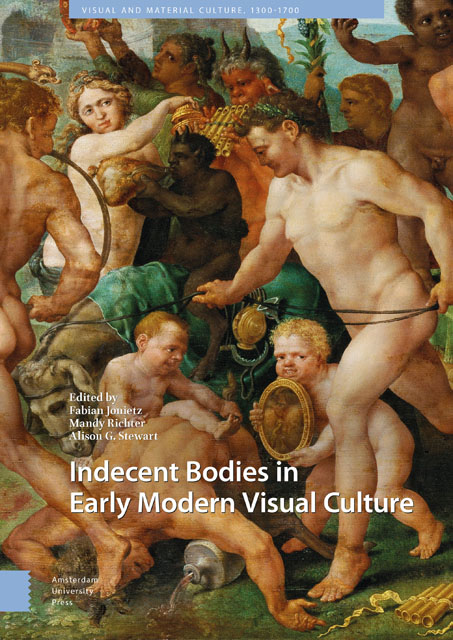Book contents
- Frontmatter
- Table of Contents
- List of Illustrations
- Indecent Bodies in Early Modern Visual Culture: An Introduction
- 1 Taste, Lust, and the Male Body: Sexual Representations in Early Sixteenth-Century Northern Europe
- 2 Private Viewings: The Frankfurt Context of Sebald Beham’s Die Nacht
- 3 To Show or Not to Show? Marcantonio Raimondi and the Representation of Female Pubic Hair
- 4 Treating Bodily Impurities: Skin, Art, and Medicine
- 5 Indecent Exposure and Honourable Uncovering in Renaissance Portraits of Women
- 6 Lust in Translation: Agency, Sexuality, and Gender Configuration in Pauwels Franck’s Allegories of Love
- 7 ‘So this guy walks into a forest…:’ obscenity, humour, sex, and the equine body in hans baldung’s Horses in a forest woodcuts (1534)
- 8 Indecent Creativity and the Tropes of Human Excreta
- 9 ‘It All Turns to Shit’ – The Land of Cockaigne in Sixteenth-Century German Woodcuts
- 10 Noëls and Bodily Fluids: The Business of Low-Country Ceremonial Fountains
- Index
10 - Noëls and Bodily Fluids: The Business of Low-Country CeremonialFountains
Published online by Cambridge University Press: 19 April 2023
- Frontmatter
- Table of Contents
- List of Illustrations
- Indecent Bodies in Early Modern Visual Culture: An Introduction
- 1 Taste, Lust, and the Male Body: Sexual Representations in Early Sixteenth-Century Northern Europe
- 2 Private Viewings: The Frankfurt Context of Sebald Beham’s Die Nacht
- 3 To Show or Not to Show? Marcantonio Raimondi and the Representation of Female Pubic Hair
- 4 Treating Bodily Impurities: Skin, Art, and Medicine
- 5 Indecent Exposure and Honourable Uncovering in Renaissance Portraits of Women
- 6 Lust in Translation: Agency, Sexuality, and Gender Configuration in Pauwels Franck’s Allegories of Love
- 7 ‘So this guy walks into a forest…:’ obscenity, humour, sex, and the equine body in hans baldung’s Horses in a forest woodcuts (1534)
- 8 Indecent Creativity and the Tropes of Human Excreta
- 9 ‘It All Turns to Shit’ – The Land of Cockaigne in Sixteenth-Century German Woodcuts
- 10 Noëls and Bodily Fluids: The Business of Low-Country Ceremonial Fountains
- Index
Summary
Abstract
The use of fountains displaying bodily fluids in both human and animalform was common in the Renaissance and the Middle Ages. The practice hasa special function within the festive culture of Low Country ceremonies.Far from being regarded as indecent, fountains depicting urinating,lactating and vomiting set the spectacle in an atemporal festive timewhich could be read in accordance with numerous interpretativetraditions, including that of Christianity. Different thinkers regardedanimals as more or less moral than humans, but there was a strain ofthought that saw animals and fountains as having a comparable innerlife. Fountains existed in a fantasy world. Unacceptable conduct wasread symbolically when depicted by a fountain.
Keywords: animals; princely entries; statues; urination
Brussels, Respect and the Puer Mingens
Amongst other people there were some jesters, students as well as others,who said to the foreigners: When you people go back home and if you talkabout Manneken Pis, they’ll ask you if you too greeted him, andif you do not do it and you say no, they won't believe you andthey’ll say that you haven't seen it: for it is commonusage that you honour it in person. Hearing this, many followed theiradvice, and saluted the gentle Manneken. The girls, the maidens, eventhe spiritual virgins (that is, those vowed to chastity) say it was apleasure to see. And there are also a lot of people from this country,and even from the City of Brussels, who never pass Manneken Pis withoutgreeting and saluting it.
Onder andere waren daer eenige Spot-vogels soo Studenten als andere, dietot de Vremdelingen seyden; Als gy-lieden in uw’ Landt komt envan dit Mantje-pis sult spreken, sal-men u vragen, of gy het oockgesalueert hebt, en soo gy het niet en doet, en hun neen antwoordt,sal-men u niet gelooven, en seggen dat gy het niet gesien hebt: want hetis een gemeyn gebruyck dat men het selve eer bewyse. Hier op warendervele die hunnen raedt volghden, en het aerdigh Mantje salueerden.
- Type
- Chapter
- Information
- Indecent Bodies in Early Modern Visual Culture , pp. 257 - 278Publisher: Amsterdam University PressPrint publication year: 2022



